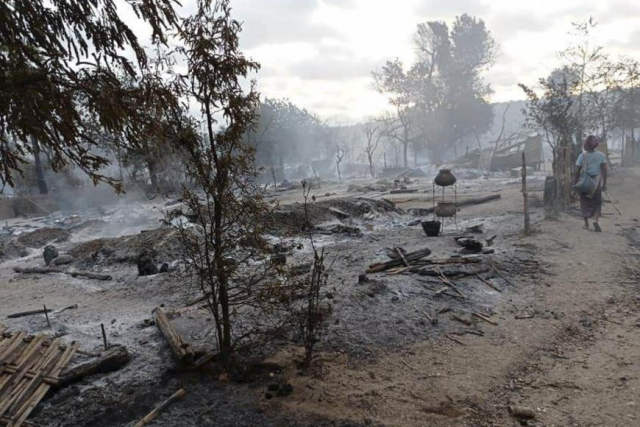Myanmar Atrocities Show Need for International Action
15 December 2021


A resident walks past smoldering houses following an alleged military attack on Kinma village, Pauk township, Magway Region, in central Myanmar, June 16, 2021. © 2021 AP Photo
Sagaing Massacre Latest in Military’s Escalating Terror Campaign
In a year where atrocities by Myanmar’s military have been commonplace, credible reports of a massacre of 11 people, including 5 children, who were bound, shot, and then burned, have sparked revulsion and outrage.
Photos and video circulated online show the remains of the victims in Don Taw village, Sagaing Region, in northwestern Myanmar. Villagers returning from hiding after fleeing a military raid used their mobile phones to record the charred remains on December 7, 2021. Local media reported that government security forces committed the killings in retaliation for an attack earlier that morning by anti-junta militia.
The United Nations issued a statement that it was “appalled and alarmed at the escalation of grave human rights abuses in Myanmar.”
But the killings – and the burnings of the bodies – bear all the hallmarks of the Myanmar military. Decades of impunity for the worst crimes have created a mindset that soldiers can brazenly commit such atrocities without fear of being held accountable.
Human Rights Watch has previously documented the Myanmar military’s scorched earth campaigns in ethnic minority areas in Kachin and Karen States, and in Rakhine State against the ethnic Rohingya and Rakhine populations.
The Myanmar military is now deploying those tactics in the Sagaing Region, committing atrocities against civilians in response to attacks by People’s Defense Forces on security forces. From May to August, massacres were reported in villages across Kani township, with dozens of civilians killed in a series of incidents.
In September, the military also was implicated in massacres against the ethnic Yaw people in Gangaw township and elsewhere in Magwe Region.
Concerned governments should impose asset freezes that impact the flow of revenues to Myanmar’s military. But they should also press for the United Nations Security Council to refer the situation in Myanmar to the International Criminal Court. Prosecutors in many countries can also use the legal principle of universal jurisdiction to bring to justice to military commanders implicated in war crimes and other abuses. That’s happened recently in Argentina, where a national court will investigate the military’s crimes against the Rohingya, the first court to hear directly from the Rohingya victims themselves.
The latest killings show Myanmar’s military is escalating its campaign of terror. Without urgent and coordinated international efforts to halt military abuses, more atrocities can be expected in the year ahead.
Announcements
21 May 2025
Open letter: Malaysia must lead ASEAN with principle, not hypocrisy, to address the Myanmar crisis

Progressive Voice is a participatory rights-based policy research and advocacy organization rooted in civil society, that maintains strong networks and relationships with grassroots organizations and community-based organizations throughout Myanmar. It acts as a bridge to the international community and international policymakers by amplifying voices from the ground, and advocating for a rights-based policy narrative.